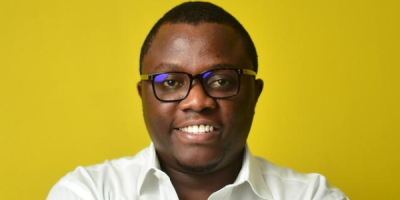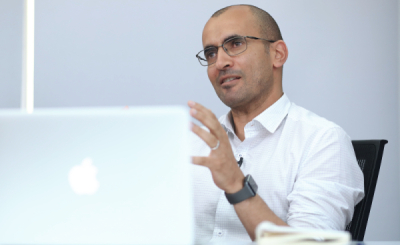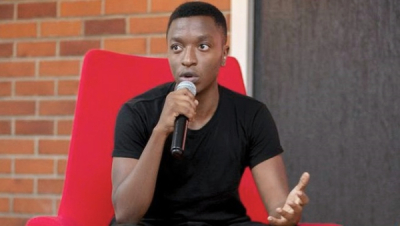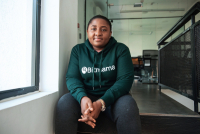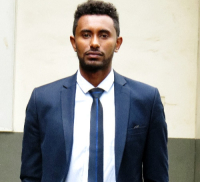
TECH STARS (960)
The trained physician is a tech enthusiast and serial entrepreneur. From 2011 to date, he has founded three healthtech ventures.
Dennis Addo (photo) is a Ghanaian physician and entrepreneur. He is also the founder and CEO of health tech start-up Wala Digital Health, which he launched in 2019.
His startup, which was selected for the regional stage of the MEST Africa Challenge 2022, aims to facilitate hospitals’ access to blood products during medical emergencies. For that purpose, it developed a digital platform allowing hospitals and blood banks to order blood products and get them delivered.
The CEO, who is committed to the healthtech sector, is also the founder of Clarondoc, an online platform connecting Africans with health professionals since its launch in 2018. He is also the founder and CEO of Claron Health International, a health maintenance organization founded in 2011.
Apart from his entrepreneurial career, he has had a professional career boasting positions at national and national institutions. He started, in 2007, as a public health consultant and project manager at the Ghanaian Defense Ministry’s health directorate. About six years later, he was hired by the UN as a senior medical officer for missions in Côte d’Ivoire. From March to September 2020, he was a member of the global implementation team of the citizen-centric movement Covid Safe Paths.
Currently, he is a member of the board of the Ghanaian National Health Insurance Authority.
Melchior Koba
The serial entrepreneur, who plans to build the Amazon of Africa, is based in Mali where he has established several tech companies.
Boubacar Biro Baldé (photo) is a Guinean computer scientist and tech entrepreneur. He is the CEO of Sodishop, an e-commerce platform founded in 2018.
“We sell everything, to everyone, everywhere,” Boubacar was saying in 2019 indicating the broad range of products available on the platform.
Although it was founded in Mali, it is also operational in Senegal and Côte d’Ivoire with over about 3,000 active buyers (Sodishopers) and more than 1,000 active sellers. It aims to scale to the whole of Africa, therefore, fulfilling its dream of being able to deliver even to the remotest areas on the continent. To attract the resources required for its ambition, it enrolled in the MEST Africa Challenge, launched on August 5, 2022. It made it to the regional round awaiting the continental round, which will entitle two winners to a check of US$50,000.
The CEO is also the principal manager of Sodifood, a food products’ sales and delivery platform he founded in Mali in 2020. He also leads iGandal, an e-learning platform he founded in 2020. Also, since 2015, he is the CEO of Technologie House, a tech company specializing in digital security, software, and website development, among others.
His entrepreneurial career builds on the experience he acquired during his professional career which started in 2009. That year, he joined JIU HUA Technology as the technical and after-sales service manager. The following year, he was hired by IT equipment and services provider SOMATI in Guinea and at the same time founded the social network Africa60. In 2013, SOMATI sent him to Mali as the company's director in the country. He remained in that post until 2015 when he launched Technologie House, kicking off his entrepreneurship career.
Melchior Koba
He is a computer scientist by training. After a fulfilling national and international career, he has developed several tech solutions catering to needs in several business segments.
Onyeka Akumah (photo) is a Nigerian tech entrepreneur specializing in transportation, agriculture, real estate, and media. He is the co-founder and CEO of Treepz, a shared mobility startup. The startup, formerly known as Plentywaka, was born out of a desire to make travel more comfortable and safe after an unpleasant experience the tech entrepreneur had on a public transport bus in Lagos.
Treepz was founded in 2019, in Nigeria. Some three years on, it is already present in Ghana and Uganda with more expansive ambitions. In November 2021, its CEO told TechCrunch that it was planning to expand further in East and West Africa. We are also really interested in Ethiopia. So the same thing we were doing with Ghana, across Ghana to Togo and Benin from Nigeria for the West African region. So next year, we will consolidate on our positions on East Africa and West Africa and start collapsing in on sub-Saharan Africa,” he said.
Before embarking on the Treepz adventure, the CEO had co-founded agtech startup Farmcrowdy, in 2016. He led the agtech as the CEO (until 2021) and board chairman (until March 2022). In 2020, he also co-founded the crowdfunding platform Crowdyvest, which he ran for a year before selling it in 2021. Six years earlier, in 2014, he co-founded the Nigerian news aggregator QwikGist.com which he also sold six months later.
Since 2019, he is a mentor for the business incubator Founder Institute. He is also a mentor, since 2021, with investment company Techstars. He started his professional career, in 2006, working as a UI and web developer for CITzar Limited. In 2007, he was hired, as a digital content developer, by Content Digital Solutions Ltd. Months later, he became a webmaster for the British Council.
In 2010, the financial firm Deloitte appointed him as e-marketing coordinator for the company in Ghana, Nigeria, Gambia, and Kenya. The same year, he joined the Nigerian online travel agency Wakanow.com as an online marketing manager. In 2012, the online shopping marketplace Jumia Nigeria appointed him as marketing and partnerships manager before he joined Guaranty Trust Bank as head of online and mobile marketing.
From 2011 to 2013, he was a senior consultant for the digital management company Anozim Group. In March 2013, he joined Konga Online Shopping as vice president of marketing before assuming the position of chief commercial officer at travel agency Travelbeta.com in 2015.
Onyeka Akumah has received several awards for his works. In 2015, he was named Digital Marketing Person of the Year at the Nigerian Technology Awards. In 2017, he was named on the West African Youth Confederation’s list of the 100 most influential under 40 West African individuals and the Westerwelle Foundation’s list of the top 25 young founders.
In 2018, he was named the Tech Entrepreneur of the Year at the Nigeria Technology Awards before being crowned Entrepreneur of the Year 2019 at the 2020 GAGE Awards. In 2019, he was named on The African Report’s list of the 100 most influential Africans. Onyeka Akumah also made it to the African Leadership Magazine’s list of Persons of the Year as the African Agricultural Champion of the Year 2020. He was even featured in Vanguard Newspaper's list of Nigerian CEOs under 40 years in 2020.
Melchior Koba
Together with his friends, who are also investors, he has helped many tech entrepreneurs in Africa and the Middle East gain access to funding. He is now back to his passion: tech entrepreneurship.
Ziad Mokhtar (photo) is an Egyptian venture capitalist and tech entrepreneur. He is the co-founder and managing partner of venture capital firm Algebra Ventures, founded in 2016 with Tarek Assaad and Karim Hussein.
By partnering with bold and resilient entrepreneurs, Algebra Ventures allows the creation of ventures that can have strong positive impacts on residents in Africa and the Middle East. Through its first fund, Algebra Ventures financed several startups -including Elmenus, Trella, Eventtus, Orcas, and La Reina- earning Ziad Mokhtar a spot on the board of the funded startups.
In September 2020, Mokhtar announced his withdrawal from the venture capital firm’s decision-making circle, remaining just the managing partner of the first fund. He aimed to renew his passion: tech entrepreneurship.
“Some might think that walking away from Algebra, given where it is now heading, is foolish. I sometimes thought that myself. But as foolish as it might be, I hope it sets me on a path to discover equally meaningful success,” he said that year. Months later, in July 2021, he founded a tech startup baptized expeditions.tech.
About twelve years ago, when he graduated from the University of Alexandria, he assumed a position as a software developer at Unilever (he left in 2003). Concurrently, he co-founded eSpace, an IT consulting firm he managed till 2006. In 2007, he was a product marketing intern at Yahoo. Then, the following year, the tech entrepreneur became an associate at McKinsey & Company in Egypt.
In 2017, while he was managing Algebra Ventures Fund I and sitting on the board of some 15 startups, he was appointed partner of Ideavelopers, the venture capital arm of financial service company EFG Hermes.
Melchior Koba
The serial entrepreneur has founded three ventures, two of which are now defunct. These lessons learned were valuable for the young innovator who is still pursuing his tech adventure.
Dare Odumade (photo) is a Nigerian tech entrepreneur and innovator. He is also the co-founder and CEO of Chekkit Technologies Corp, a tech company leveraging blockchain technologies to protect consumers.
His tech company, launched in 2018, offers a blockchain-based mobile app that helps track food and medical products' production and distribution chain in the consumer and pharmaceutical industries. “Chekkit developed a technology of blockchain-powered unique identities for every product so OEMs, CMOs, and Brand owners can record the history and trace the journey of their products from manufacturing to the last-mile customer,” reads Dare Odulade’s Linkedin about section.
Thanks to its mobile app, Chekkit Technologies Corp allows consumers to authenticate products they purchase by scanning the unique QR code on the said products. Manufacturers also receive information on their products’ purchase history and read quality complaints. They can use the data to identify and end counterfeit chains early.
In September 2022, Chekkit Technologies Corp was selected as one of the 30 start-ups to benefit from the Bill & Melinda Gates Foundation's Investing in Innovation (i3) program.
Its CEO is a serial entrepreneur trained at the Meltwater Entrepreneurial School of Technology in 2017. In 2010 and 2015, he founded and co-founded a social network called StrictlyUI and a music streaming platform called Sharebunk App (both are defunct). He also has a professional experience in both the public and private sectors.
From 2013 to late 2014, he was the operations manager for the energy company Cannes Energy Nig. Ltd, a site supervisor for construction company Geei Designs and Constructions Nig. From September 2014 to July 2015, during his national youth service, he worked as a geophysicist for the Benue State Rural Water Supply and Sanitation Agency.
The tech entrepreneur is also a multiple award winner. In 2012, he was named an IT guru for StrictlyUI. In 2019, he received the award for the most innovative and best digital solution in Nigeria in the health sector at the United Nations World Summit Awards for Chekkit. With this recognition, he was able to sign partnerships with big tech firms like Cisco, Merck GmbH, Microsoft, and Facebook.
Melchior Koba
He ventured into entrepreneurship early, making a name for himself in Kenya. He currently runs his fintech startup, which earned him the trust of several international investors.
Geoffrey Mulei (photo) is the founder and CEO of Tanda, a fintech startup created to improve access to financial services in Africa.
Through the startup, founded in 2018, Geoffrey offers several digital products. They include Tanda Trader, an app that allows businesses to collect payments, sell their digital products, and offer loans. There is also Tanda Pocket, a virtual wallet with virtual cards to make purchases, and payments as well as manage budgets and finances. Another product is the Tanda I/O, an application programming interface (API) that helps third-party companies collect payments.
On October 4, 2022, the Kenyan tech entrepreneur secured additional financing from HAVAIC and several other investors. The funds aim to accelerate the development of Tanda products, extend the startup’s footprint in Kenya and enter new east African markets like Tanzania, Uganda, and Rwanda within 15 months.
“Our new products and growing distribution will open up opportunities for Tanda and our ecosystem partners to continue solving challenges for the majority of Africans locked out of the formal financial services ecosystem,” Geoffrey said in a release announcing the funding.
Tanda claims partnerships with 58 banks and savings and credit cooperatives, four telecom operators, 12,000 merchants and agents with over 300,000 unique clients served, and millions of shillings in transactions processed. It plans to extend its network to 100,000 merchants and agents in Kenya.
In 2016, its founder was one of the finalists of the Anzisha Prize. Before founding Tanda, he co-founded and led Inkisha -an eco-friendly packaging manufacturer and distributor- between 2015 and 2017. In 2017, he joined myLotto Kenya as the head of merchant sales, building a merchant network. Currently, he is a supply chain consultant for Think Delus Limited, a big data management consulting firm.
Melchior Koba
She is one of the few African women shaping the local cryptocurrency industry. With over six years in the industry, she has already garnered the trust of several investors.
Ruth Iselema (photo) is a trained pharmacist and founder of crypto company Bitmama Inc, launched in 2016. Her crypto company offers two products.
The first product is an eponymous mobile (Android and iOS) app that allows users to buy and sell cryptocurrencies, including Bitcoin, Ethereum, or Celo. The second one is Changera, “an International money transfer app that lets millions of people send and receive money in any currency around the world in a very fast, easy, and secure way.”
The name Bitmama comes from a combination of Bitcoin and mama. “I started learning about blockchain and cryptocurrencies earlier in 2015, through a friend and a couple of Telegram and WhatsApp groups I joined. Just as it is now, I turned out to be only one out of maybe two women in the space. Because most of the conversations happened online and we did not see one another physically, people assumed I was an elderly woman. So they started calling me ‘Bitmama’ — a combination of bitcoin and mama — and the name stuck,” she told Techpoint Africa.
The adventure started when she was scammed of NGN250,000 (about US$576) when trying to invest in cryptocurrencies. “Even though I did my due diligence, I still got scammed. So I decided this has to stop,” she explained.
In September 2022, Ruth secured US$1.65 million in funding to scale beyond Nigeria, Ghana, and Kenya. The funding was added to the US$350,000 she raised in October 2021. Thanks to the overall financing, she wanted to build "Africa’s most user-friendly, innovative blockchain company."
In 2018, she was one of the beneficiaries of the Green House Lab accelerator program organized by Venture Garden Group. Between 2017 and 2018, she was the director of the tech company Venhub. In late 2021, she made it to the media outlet Crypto Asset Buyer’s list of the Top 20 Individuals that shaped Nigeria’s blockchain & crypto industry that year.
Melchior Koba
His ongoing professional career is already rich with positions at national and international institutions. He combines that professional career with tech entrepreneurship allowing retailers to access FMCGs at favorable terms and competitive prices.
Dawit Nigusu (photo) is an Ethiopian software engineer and CEO of Shemach, an ecommerce startup he cofounded in 2020. His startup operates an eponymous B2B platform that allows retailers to order Fast-moving consumer goods (FMCG) from a wide variety of suppliers across the country either by paying directly or later. Shemach already claims more than 2,700 registered retailers on its platform, sourcing from eleven locally branded suppliers. In September 2022, it was selected to participate in the last cohort of the accelerator The Baobab Network for intensive training and was given a check of US$50,000 to finance its growth.
The CEO is a senior full-stack developer, since 2021, with the publishing company Scholastic Corporation. His professional career started in 2017 when he was a software engineering intern for the software company iCogs Labs.
In April 2018, he joined the University of Addis Ababa’s team as a junior software developer. He implemented several projects including the development of an online document management platform. The same year, he was hired by fintech company L-IFT, as a React Developer. Concurrently, he was also a software engineer for mobility startup ZayRide.
In June 2019, was recruited by the Food and Agriculture Organization of the United Nations (FAO) as a Senior Software Engineer in Ethiopia. A few months later, he was promoted to Senior Full Stack Web Developer with L-IFT. He also ventured into tech entrepreneurship by founding his e-commerce company. From August 2021 to January 2022, he was a software engineering consultant for the FAO.
Melchior Koba
Before going into digital entrepreneurship eight years ago, he built a solid professional experience in several fields, including energy, health, and banking. He is now contributing the lessons learned for digital inclusion both in and outside his native country.
Martin Stimela (photo) is a Botswanan entrepreneur and CEO of Brastorne Enterprises, an event tech company he co-founded in 2013.
Through Brastorne Enterprises, he developed three solutions that promote the digital inclusion of rural populations, who mostly cannot afford smartphones. The first solution is USSD mAgri, which allows farmers to sell their products and services nationwide, as well as access agricultural/market information, and short-term financing.
The second solution is Vuka USSD, a social network that enables “users on both low-end phones and smartphones to create profiles, add friends, create groups, chat & send in-person messages, group chats or broadcast messages.”
Then there is Mpotsa, a “question/answer platform that aims to provide users with information on almost everything” and receive valuable alerts.
“We literally enable the underserved to connect without the need for data plans. In simple sense, we’ve got technology that allows you to either use voice prompts or use a technology called USSD, which is mainly used for mobile money transactions here in Africa. It’s literally just text strings. But using that, you can actually connect to the internet, fetch data, and dumb it down, and bring it back, which is quite crucial to people who don’t have access,” Martin explained during a Stanford Graduate School of Business Grit and Growth podcast in 2021.
Currently, he is the Vice President of the Southern African chapter of the Stanford Seed program sponsored by the Stanford University Graduate School of Business. In 2019, he took part in the Alibaba eFounders Fellowship program that “provides first-hand exposure to ecommerce and digital innovations, and access to business leaders.” His professional career started in 2004, when he was recruited, as a business analyst, by British energy company E.ON UK. He later joined Lloyds Banking Group as a transformation project manager before his appointment, as project manager, by energy company RWE npower.
In 2011, he was hired by the Centers for Disease Control and Prevention, as the director of informatics. In 2012, Martin Stimela became the Chief Technology and Operations Officer of the Health Systems Strengthening Society. Then, the following year, he was appointed CEO of CIRA Energy. Concurrently, he kicked off his entrepreneurial journey with Brastorne Enterprises. In 2015, he was appointed executive director for enterprise support at the Botswana Savings Bank.
In Botswana, his company already claims more than 1 million users, “with 350k monthly users, and over 40% of active feature phone users on the Orange network.” In the Democratic Republic of the Congo, it claims over 800,000 users since its launch in May 2021. In September 2022, it was selected as one of the 60 African startups that will participate in the Google for Startups Black Founders Fund 2022.
Melchior Koba
He currently leads three innovative firms that are gradually making their way to become references in innovation training and in the fabrication industry. His efforts have been rewarded with national and international awards.
Tochukwu Clinton Chukwueke (photo) is a Nigerian industrialist and an expert in Computer-aided design and manufacturing. He is also the co-founder and CEO of Clintonel Technology, an engineering company specializing in research, technology product development, and manufacturing.
He founded Clintonel Technology, in 2014, to contribute to tech development in Africa and create attractive products useful both for local and international consumers. Through the tech company, he also devotes part of his time to training since he is well aware of the importance of education for sustainable development.
To efficiently share his expertise, he created Clintonel Innovation Center (CIC) in 2017. The CIC, which includes a fablab, a business incubator, and a tech incubation center, builds the youth’s innovation and product development capacity by providing training, mentoring, and equipment to create local products and start new businesses. With the CIC, Tochukwu Clinton Chukwueke claims more than 870 engineering students and over 1,000 secondary school students trained.
The industrialist is also the founder of Clintonel Advanced Engineering Center (AEC), an advanced precision manufacturing company that designs and manufactures industrial tools and equipment mostly.
In June 2022, thanks to AEC, Tochukwu Clinton Chukwueke received the award of the most outstanding MSME in Nigeria. A few months later, in September, thanks to the CIC, the Nigerian industrialist won the Autodesk Excellence Awards for his Nigerian Genius Engineering Challenge, a competition created “to encourage tertiary institutions [...] to equip engineering students with essential industry and manufacturing skills, and boost local technology to result in employment opportunities and economic development.”
“This international Award of Excellence is a great honor for our organization. It is an appreciation to all who contributed to the success of the Nigerian Genius Engineering Competition 2022,” Clinton said welcoming the excellence award.
The same month, Clintonel Innovation Center signed a partnership with the multinational software company Autodesk to promote Computer-aided design and manufacturing and encourage the local production of industrial equipment.
In 2018, Clinton founded the Hardware Nigeria Community (HNC), a “national network of Nigerian Inventors, Makers and hardware Entrepreneurs.” He started his professional career in 2012. At the time, he was hired, as a finance officer, by Brilliant Model Schools. That year, he was also selected by the Nigerian Ministry of Trade and Investment as one of the Nigerian Innovators.
Melchior Koba
More...
The tech and business enthusiast wants to make iiDENTIFii one of the global remote authentication leaders. Several awards have already welcomed his efforts.
Gur Geva (photo) is a South African tech entrepreneur and founder of iiDENTIFii. His startup, launched in 2017, specializes in digital identification, biometric verification, artificial intelligence, and machine learning.
For Gur Geva, iiDENTIFii is the most appropriate response to current security issues faced by individuals and companies. He wants to make the startup a global reference in remote authentication. For that purpose, he succeeded in getting iiDENTIFii integrated into the Microsoft Global Partner Network, a coveted professional network bringing together credible companies that provide identity verification services to multinational clients in the banking, insurance, retail, e-commerce, healthcare, gaming, and education sectors.
In September 2022, he raised US$15 million in growth capital to expand the identity protection business in Africa. “We’re excited to put the investment to work as we close in on our goal of authenticating every face in Africa. With this new funding and the networks of Arise, Sanari, and Bill – we are confident to continue our mission of stopping identity theft in Africa,” Gur Geva said after the raise led by Arise, one of Africa’s leading investment companies.
Before founding iiDENTIFIi, Gur Geva first launched InDox, “a professional document collection service for the largest 200 Credit Providers in South Africa.” He led InDOx, as the CEO, up till May 2019.
Thanks to iiDENTIFii, he won the Digital Innovation Award at the 2019 Sunday Times Top 100 Company Awards. He also won the Best of the Show Award at the Finovate Europe 2020 Conference, and the AI Leader of the Year 2020 Award during the AfricaTech Awards.
In 2021, iiDENTIFIi was named the Best Enterprise Solution in the MTN Business App of the Year Awards. That year, iiDENTIFIi was also recognized as the New and Emerging Independent Software Vendor Partner of the Year in the Microsoft South Africa Partner of the Year Awards.
Melchior Koba
Over the past nine years, she built her event management experience with companies in various industries, including finance, telecommunications, and media.
Folayemi Agusto (photo) is the co-founder and CEO of tix.africa, a Nigerian ticketing startup founded in 2019. Through tix.africa, she offers digital services to help organizations, companies, and fair and festival organizers ensure the success of their virtual or live events.
The services offered include tools to promote events and collect payment as well as ticketing platforms. The service ecosystem simplifies logistics processes for tix. africa’s clients and boosts their profitability.
Tix is born out of personal experience. Indeed, in 2017, the startup’s cofounders (Folayemi Agusto and Nosa Oyegun) organized the third edition of the EatDrinkFestival -a food and drink festival- in Lagos, but “things didn’t go very well.”
“There were tens of thousands of people and we didn’t have a single piece of data about any one of them. Then, the poor network made making payments for food and drink an extreme sport,” the tix.africa co-founder explains.
That frustrating experience led them to enter the event management sector.
In September 2022, Folayemi announced the launch of a new service, Tix Box Office, to offer better event management support. The new service allows event managers and organizers to set up online storefronts to sell their tickets and products. “Before today, you could only list one event per page on Tix, and now on a creator’s Box Office, you can see events they have coming up,” she announced on Linkedin.
The tech entrepreneur entered the professional world, in 2013, the same year she obtained her BA in Sociology at the University of Virginia. That year, she joined Airtel Nigeria as an event and sponsorship assistant. Two years later, she was hired, as a research analyst, by SIM Capital Alliance.
She later became the guest relations and events coordinator of the job placement network Andela. In 2018, she was promoted to the position of travel experience manager.
Melchior Koba
Through his fintech ClinicPesa, he is committed to improving the living conditions of local populations. His commitment has already earned him a selection to participate in two international accelerator programs.
Onyancha Chrispinus (photo) is a Ugandan computer engineer and tech entrepreneur. In 2016, he cofounded ClinicPesa, a fintech startup that offers micro-loans to enable access to quality healthcare.
The startup he heads, as the CEO, developed a digital platform that allows users to save money to be used for healthcare needs. The funds saved can be used to settle medical bills or purchase drugs and medical devices in partner hospitals and pharmacies when needed.
It also developed ClinicPesa Mama’s, a savings platform dedicated exclusively to maternal health. It allows expectant mothers or parents to save money, via mobile money, to prepare for their baby's arrival. The funds can be used to purchase a baby’s trousseau, pay for medical transportation or bills, etc.
Its co-founder holds a Master’s in software engineering from the Swiss Federal Institute of Technology Lausanne obtained in 2015. In 2019, he secured the D-Lab Scale-Ups Fellowship grant, which aims to support “local entrepreneurs bringing poverty-alleviating products and services to emerging markets at scale.” He integrated the labor market in 2011 when he was recruited, as a software engineer, by creativeDNA, a Ugandan tech company specializing in the development of mobile and digital solutions.
After a promotion to the position of a senior software engineer in 2012, he became the company's managing director four years later. Cumulatively, he was an instructor and author with UK IT company Packt, until March 2017.
This year, his startup is among the 60 startups that will participate in the second cohort of the Google for Startups Black Founders Fund for Africa. It is also one of 30 early-stage and growth-stage startups that will benefit from the Bill & Melinda Gates Foundation-funded pan-African Investing in Innovation (i3) program.
Melchior Koba
After his higher education in Germany, he moved back to his native country to improve the quality of mobility offerings. He specifically focused on an industry crowded with amateurs: motorcycle taxis.
Patrick Timani (photo) is a Cameroonian embedded system engineer and tech entrepreneur. In 2015, he graduated from the University of Pforzheim, in Germany. He also holds a microfinance expert certification from the Frankfurt School of Finance and Management.
In 2017, he co-founded BeeGroup, a mobility startup he currently heads as the chief executive officer. His startup offers two services through its mobile app (available for Android and iOS devices).
The first service is Bee Delivery, which facilitates last-mile delivery. It covers the logistics chain and makes short, medium, and long-distance delivery with its trucks, gaining the confidence of several national and international companies in Cameroon.
The second service, which sets Patrick Timani apart in the local startup ecosystem, is Bee Moto, a motorcycle-hailing service. On its website, BeeGroup explains that Bee Moto aims to formalize the motorcycle taxi industry in French-speaking Africa.
“Motorcycle is one of the most popular modes of transport in Cameroon and other French-speaking countries, but the motorcycle transport sector is not organized. We believe that we can make a big change by offering a new, modern service that would make motorcycle transport convenient and comfortable. We are pleased to partner with Yango, an international service, to give all Cameroonians the opportunity to arrive at their destinations on time and safely,” Patrick indicated in August 2022, when signing a partnership agreement with mobility startup Yango, in Douala.
In 2020, Bee signed a partnership agreement with Baloon Insurance. It thus became the agent in charge of delivering insurance certificates to Baloon Insurance clients. In early September 2022, it secured a contract with OneAllSports - Cameroon’s national football team’s new equipment manufacturer- becoming the official dealer of OnAllSports products in Cameroon.
In June 2022, after a successful experience in Cameroon, where the mobility start-up is becoming more attractive by the day, it launched its activities in the Democratic Republic of Congo.
Before his Bee Group experience, Patrick Timani honed his skills working for renowned companies. In 2013, he completed a one-year internship at the German energy company Siemens. The following year, he worked as an intern at the optronics, system technologies, and image exploitation application development company Fraunhofer IOSB. His startup is among the 60 beneficiaries of the 2022 Google for Startups Black Founders Fund.
Melchior Koba



